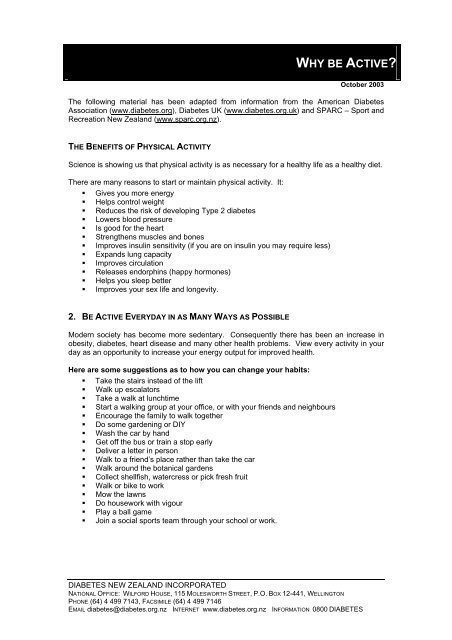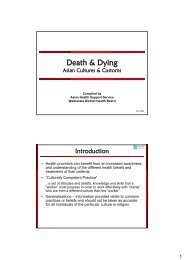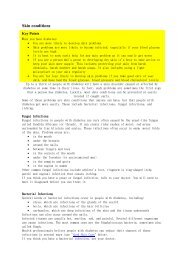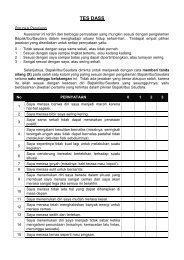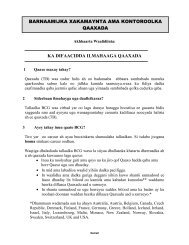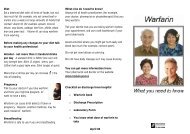English - Asian Health Services
English - Asian Health Services
English - Asian Health Services
You also want an ePaper? Increase the reach of your titles
YUMPU automatically turns print PDFs into web optimized ePapers that Google loves.
WHY BE ACTIVE?<br />
October 2003<br />
The following material has been adapted from information from the American Diabetes<br />
Association (www.diabetes.org), Diabetes UK (www.diabetes.org.uk) and SPARC – Sport and<br />
Recreation New Zealand (www.sparc.org.nz).<br />
THE BENEFITS OF PHYSICAL ACTIVITY<br />
Science is showing us that physical activity is as necessary for a healthy life as a healthy diet.<br />
There are many reasons to start or maintain physical activity. It:<br />
• Gives you more energy<br />
• Helps control weight<br />
• Reduces the risk of developing Type 2 diabetes<br />
• Lowers blood pressure<br />
• Is good for the heart<br />
• Strengthens muscles and bones<br />
• Improves insulin sensitivity (if you are on insulin you may require less)<br />
• Expands lung capacity<br />
• Improves circulation<br />
• Releases endorphins (happy hormones)<br />
• Helps you sleep better<br />
• Improves your sex life and longevity.<br />
2. BE ACTIVE EVERYDAY IN AS MANY WAYS AS POSSIBLE<br />
Modern society has become more sedentary. Consequently there has been an increase in<br />
obesity, diabetes, heart disease and many other health problems. View every activity in your<br />
day as an opportunity to increase your energy output for improved health.<br />
Here are some suggestions as to how you can change your habits:<br />
• Take the stairs instead of the lift<br />
• Walk up escalators<br />
• Take a walk at lunchtime<br />
• Start a walking group at your office, or with your friends and neighbours<br />
• Encourage the family to walk together<br />
• Do some gardening or DIY<br />
• Wash the car by hand<br />
• Get off the bus or train a stop early<br />
• Deliver a letter in person<br />
• Walk to a friend’s place rather than take the car<br />
• Walk around the botanical gardens<br />
• Collect shellfish, watercress or pick fresh fruit<br />
• Walk or bike to work<br />
• Mow the lawns<br />
• Do housework with vigour<br />
• Play a ball game<br />
• Join a social sports team through your school or work.<br />
DIABETES NEW ZEALAND INCORPORATED<br />
NATIONAL OFFICE: WILFORD HOUSE, 115 MOLESWORTH STREET, P.O. BOX 12-441, WELLINGTON<br />
PHONE (64) 4 499 7143, FACSIMILE (64) 4 499 7146<br />
EMAIL diabetes@diabetes.org.nz INTERNET www.diabetes.org.nz INFORMATION 0800 DIABETES
3. AIM FOR AT LEAST 30 MINUTES OF MODERATE-INTENSITY PHYSICAL ACTIVITY ON<br />
MOST DAYS<br />
Your goal is to achieve moderate physical activity for at least 30 minutes each day. Thirty<br />
minutes is all it takes to receive the health benefits, such as improvements in blood pressure,<br />
blood cholesterol and body weight.<br />
However, note that:<br />
• The exercise does not have to be continuous. It can be taken in bite-sized chunks such<br />
as 10-minute intervals to be beneficial.<br />
• It also doesn't have to be strenuous or vigorous – any movement can be beneficial.<br />
Moderate-intensity activity will cause a slight, but noticeable, increase in breathing and<br />
heart-rate. A good example is brisk walking at a pace where talking is comfortable but singing<br />
is not.<br />
Most adults do not have to consult their doctor before commencing moderate-intensity<br />
physical activity. However, for people with diabetes or heart disease it is advisable to<br />
consult a doctor or your diabetes team before starting a programme of physical activity.<br />
You may wish to ask your family doctor for a Green Prescription.<br />
4. IF POSSIBLE, ADD SOME VIGOROUS EXERCISE FOR EXTRA HEALTH AND FITNESS<br />
Greater health benefits can be achieved by increasing the amount (duration, frequency or<br />
intensity) of physical activity beyond those achieved through increasing daily movement or<br />
regular moderate-intensity activity. Vigorous exercise can come from sports such as tennis,<br />
badminton, netball and activities such as swimming and jogging.<br />
Seek advice from your family doctor before starting a vigorous exercise routine.<br />
DIABETES NEW ZEALAND INCORPORATED<br />
NATIONAL OFFICE: WILFORD HOUSE, 115 MOLESWORTH STREET, P.O. BOX 12-441, WELLINGTON<br />
PHONE (64) 4 499 7143, FACSIMILE (64) 4 499 7146<br />
EMAIL diabetes@diabetes.org.nz INTERNET www.diabetes.org.nz INFORMATION 0800 DIABETES


